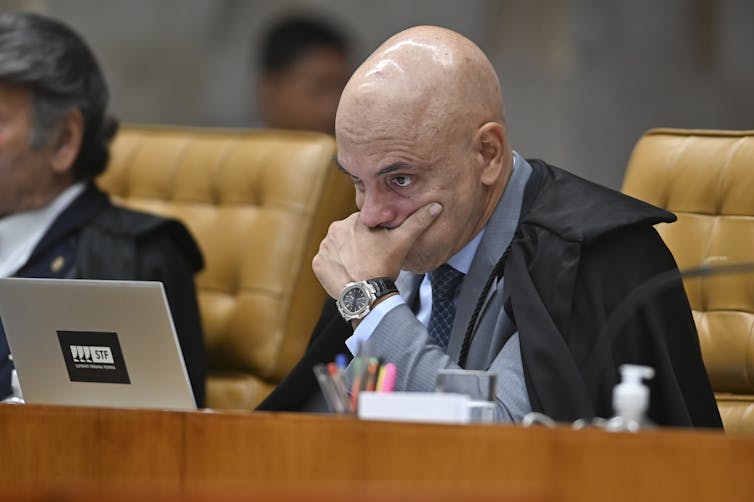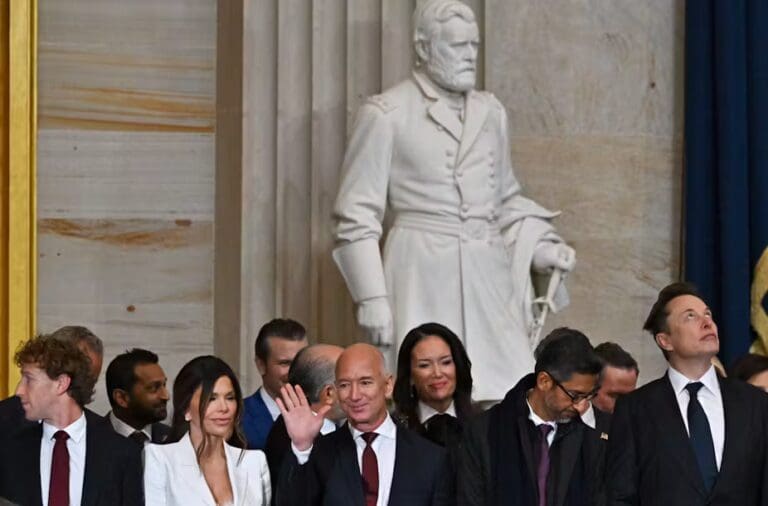Social media platforms tend not to be that bothered by national boundaries.
Take X, for example. Users of what was once called Twitter span the globe, with its 600 millions-plus active accounts dotted across nearly every country. And each of those jurisdictions has its own laws.
But the interests of national regulatory efforts and that of predominantly U.S.-based technology companies often don’t align. While many governments have sought to impose oversight mechanisms to address problems such as disinformation, online extremism and manipulation, these initiatives have been met with corporate resistance, political interference and legal challenges invoking free speech as a shield against regulation.
What is brewing is a global struggle over digital platform governance. And in this battle, U.S. platforms are increasingly leaning on American laws to challenge other nation’s regulations. It is, we believe as experts on digital law – one an executive director of a forum monitoring how countries implement democratic principles – a form of digital imperialism.
A rumble in the tech jungle
The latest manifestation of this phenomenon occurred in February 2025, when new tensions emerged between Brazil’s judiciary and U.S.-based social media platforms.
Trump Media & Technology Group and Rumble filed a lawsuit in the U.S. against Brazilian Supreme Court Justice Alexandre de Moraes, challenging his orders to suspend accounts on the two platforms linked to disinformation campaigns in Brazil.
The case follows earlier unsuccessful efforts by Elon Musk’s X to resist similar Brazilian rulings.
Together, the cases exemplify a growing trend in which U.S. political and corporate actors attempt to undermine foreign regulatory authority by pressing the case that domestic U.S. law and corporate protections should take precedence over sovereign policies globally.
From corporate lobbying to lawfare
At the core of the dispute is Allan dos Santos, a right-wing Brazilian influencer and fugitive from justice who fled to the U.S. in 2021 after De Moraes ordered his preventive arrest for allegedly coordinating disinformation networks and inciting violence.
Dos Santos has continued his online activities abroad. Brazil’s extradition requests have gone unanswered due to claims by U.S. authorities that the case involves issues of free speech rather than criminal offenses.
Trump Media and Rumble’s lawsuit attempts to do two things. First, it seeks to frame Brazil’s judicial actions as censorship rather than oversight. And second, it seeks to portray the Brazilian court action as territorial overreach.
Their position is that as the target of the action was in the U.S., they are subject to U.S. free speech protections under the First Amendment. The fact that the subject of the ban was Brazilian and is accused of spreading disinformation and hate in Brazil should not, they argue, matter.
For now, U.S. courts agree. In late February, a Florida-based judge ruled that Rumble and Trump Media need not comply with the Brazilian order.
Big Tech pushback to regulation
The case signals an important shift in the contest over platform accountability – a move from corporate lobbying and political pressure to direct legal intervention in foreign jurisdictions. U.S. courts are now being used to challenge overseas decisions regarding platform accountability.
The outcome and the broader legal strategy behind the lawsuit could have far-reaching implications not only for Brazil but for any country or region – such as the European Union – attempting to regulate online spaces.
The resistance against digital regulation predates the Trump administration.
In Brazil, efforts to regulate social media platforms have long faced substantial opposition. Big Tech companies – including Google, Meta and X – have used their economic and political influence to lobby against tighter regulation, often framing such policies as a threat to free expression.
In 2020, the Brazilian “Fake News Bill,” which sought to hold platforms accountable for the spread of disinformation, was met with strong opposition from these companies.
Google and Meta launched high-profile campaigns to oppose the bill, warning it would “threaten free speech” and “harm small businesses.” Google placed banners on its Brazilian homepage urging users to reject the legislation, while Meta ran advertisements questioning its implications for the digital economy.
These efforts, alongside lobbying and political resistance, were successful in helping to delay and weaken the regulatory framework.
Mixing corporate and political power
The difference now is that challenges are blurring the line between the corporate and the political.
Trump Media was 53% owned by the U.S. president before he moved his stake into a revocable trust in December 2024. Elon Musk, the free speech fundamentalist owner of X, is a de facto member of the Trump administration.
Their ascent to power has coincided with the First Amendment being wielded as a shield against foreign regulations on digital platforms.
Free speech protections in the U.S. have been applied unequally, allowing authorities to suppress dissent in some cases while shielding hateful speech in others.
This imbalance extends to corporate power, with decades of legal precedent expanding protections for private interests. The case law cemented corporate speech protections, a logic later extended to digital platforms.
U.S. free speech advocates in Big Tech and the U.S. government are seemingly escalating this trend to an even more extreme interpretation: that American free speech arguments can be deployed to resist the regulation of other jurisdictions and challenge foreign legal frameworks.
For instance, in response to the European Union’s Digital Services Act, U.S. Federal Communications Commission Chairman Brendan Carr, a Trump appointee, expressed concerns that the act could threaten American free speech principles.

Ton Molina/NurPhoto via Getty Images
Such an argument may have been fine if the same interpretation of free speech – and its appropriate protections – were universally accepted. But they are not.
The concept of free speech varies significantly across nations and regions.
Countries such as Brazil, Germany, France and others adopt what legal experts refer to as a proportionality-based approach to free speech, balancing it against other fundamental rights such as human dignity, democratic integrity and public order.
Sovereign countries using this approach recognize freedom of expression as a fundamental and preferential right. But they also acknowledge that certain restrictions are necessary to protect democratic institutions, marginalized communities, public health and the informational ecosystem from harms.
While the U.S. imposes some limits on speech – such as defamation laws and protection against incitement to imminent lawless action – the First Amendment is generally far more expansive than in other democracies.
The future of digital governance
The legal battle over platform regulation is not confined to the current battle between U.S.-based platforms and Brazil. The EU’s Digital Services Act and the Online Safety Act in the United Kingdom are other examples of governments trying to assert control over platforms operating within their borders.
As such, the lawsuit by Trump Media and Rumble against the Brazilian Supreme Court signals a critical moment in global geopolitics.
U.S. tech giants, such as Meta, are bending to the free speech winds coming out of the Trump administration. Musk, the owner of X, has given support to far-right groups overseas.
And this overlap in the policy priorities of social media platforms and the political interests of the U.S. administration opens a new era in the deregulation debate in which U.S. free speech absolutists are seeking to establish legal precedents that might challenge the future of other nations’ regulatory efforts.
As countries continue to develop regulatory frameworks for digital governance – for instance, AI regulation imposing stricter governance rules in Brazil and in the EU – the legal, economic and political strategies platforms employ to challenge oversight mechanisms will play a crucial role in determining the future balance between corporate influence and the rule of law.![]()
Yasmin Curzi de Mendonça, Research associate, University of Virginia and Camille Grenier, Associated Expert at the Technology and Global Affairs Innovation Hub, Sciences Po
This article is republished from The Conversation under a Creative Commons license. Read the original article.
